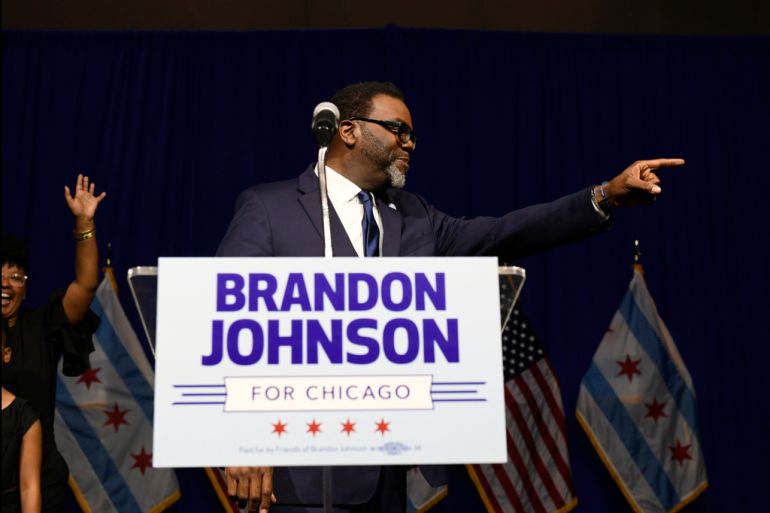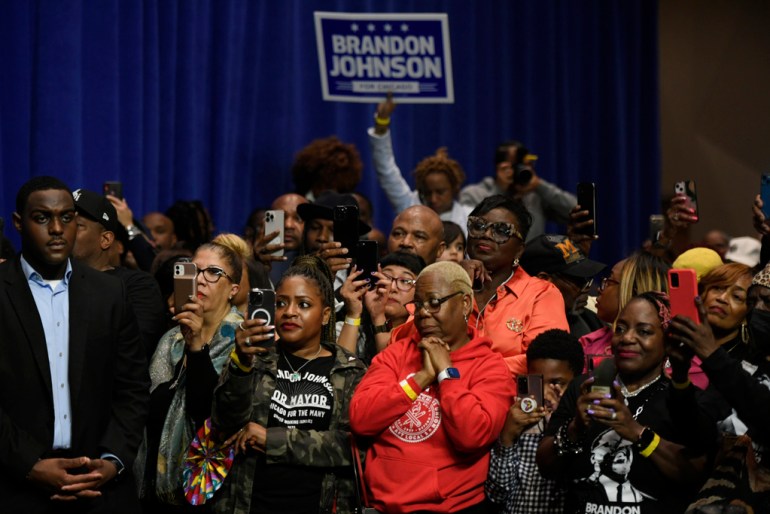US progressives galvanised by victory in Chicago mayoral race
Progressive Brandon Johnson narrowly defeated the more conservative Paul Vallas in a highly-anticipated vote.

The election of Brandon Johnson as the next mayor of Chicago, Illinois — the third largest city in the United States — has electrified progressives, according to experts who saw the race as a referendum on the future of the Democratic Party.
“People were watching the results come in and could barely believe it,” Robert Peters, an Illinois state senator and Democrat representing Chicago’s 13th district, told Al Jazeera. “It’s a testament to how far we’ve come in building a multi-racial, working-class coalition.”
Keep reading
list of 3 itemsIn Chicago mayoral vote, crime is focus in open race
US capital withdraws criminal justice reform bill
Once seen as a long-shot candidate, the progressive Johnson advanced to a run-off election against Paul Vallas, a conservative Democrat who pushed an aggressive message on crime and touted the endorsement of law enforcement groups.
But Johnson, a former teacher and union organiser, ultimately won 51.42 percent of the vote compared with 48.58 percent for Vallas, who conceded on Wednesday.
The election highlighted schisms in the Democratic Party, with a rising progressive movement fighting to gain ground against the party’s establishment wing.
Experts say Vallas’s platform reflected concerns that Democrats were perceived as “soft on crime”, a common criticism levelled by Republicans who point to an uptick in violent crime during the COVID-19 pandemic.
Vallas counted the city’s Fraternal Order of Police (FOP) among his supporters. During his campaign, he said Chicago had experienced an “utter breakdown in law and order” in recent years, vowing to expand the city’s police force.
Johnson, meanwhile, campaigned on a more progressive platform. He advocated for criminal justice reform, including increased police accountability and greater investment in community and mental health services.
He also touted his support from labour groups such as the Chicago Teachers Union (CTU) and US Senator Bernie Sanders, a prominent progressive voice.
But Johnson’s campaign was dogged by accusations that he would “defund the police”, a rallying cry that emerged after the 2020 killing of George Floyd, a Black man who died after an officer kneeled on his neck in Minneapolis, Minnesota.
Johnson has denied any plans to defund Chicago’s police force, saying instead he hopes to approach public safety in a more “holistic” way.

Long-shot candidate
Few initially expected Johnson, who serves on the Cook County Board of Commissioners, to be in the final round of the election at all.
The first round of voting took place on February 28. The crowded field of candidates included incumbent Lori Lightfoot, the first Black woman to serve as mayor of Chicago.
But Lightfoot’s popularity suffered during the pandemic. She clashed with constituencies on both the left and right, and also weathered disputes with the police and teacher’s union.
Ultimately, she came in third, becoming the first mayor to lose her reelection bid since 1983.
None of the candidates won more than 50 percent of the vote in the first round. But Vallas and Johnson earned the most votes, allowing them to proceed to Tuesday’s run-off.
Many commentators and politicians saw Lightfoot’s defeat — and the fact that Vallas was the top vote-getter in the initial round of voting — as a sign that being “tough on crime” would pay electoral dividends.
“Lori Lightfoot. Crime doesn’t pay,” far-right Congresswoman Marjorie Taylor Greene wrote on Twitter at the time.
Range of issues
While crime loomed large in the election, other issues were also on the minds of Chicago voters as they returned to the ballot box on Tuesday.
In response to an email inquiry from Al Jazeera, the group 48th Ward Neighbors for Justice said they had been drawn to Johnson for his progressive stance on issues such as housing, mental health services and funding for public schools.
“What set Johnson apart from his competitors was his vision of building a better Chicago for the people, not a return to the old ways of prioritising the political establishment and wealthy insiders,” member Jamie Cernek told Al Jazeera.
Ameshia Cross, a Democratic strategist in Chicago, also supported Johnson over Vallas in part because of the latter’s history of promoting charter schools.
“Chicago is a union town,” she told Al Jazeera over a phone call on Wednesday. “His legacy of school privatisation was not going to fly here.”
She added that Vallas’s harsh rhetoric on crime discomforted some of the city’s Black voters, who heard echoes of right-wing themes.
During the campaign, FOP president John Catanzara predicted that up to 1,000 police officers would quit their jobs if Johnson won and ominously warned that his election would mean “blood in the streets”.
“Many communities are concerned about crime but there is a long history of police abuse in Chicago, so some of that rhetoric backfired,” said Cross. “Vallas was listening to too much Fox News.”
Aaron Gottlieb, an assistant professor who researches criminal justice at the University of Chicago, told Al Jazeera that voters do not always buy the idea that embracing reform means sacrificing public safety.
“Chicago spends a lot on its police force, and under that approach, we’ve seen crime go up and crime go down,” Gottlieb said.
“When people are made aware of alternative approaches, they seem to have some openness. They probably don’t want to discard policing entirely but there seems to be an appetite for things like a greater emphasis on providing social services and less reliance on incarceration.”
Peters, the state senator, has been at the forefront of efforts to roll back the use of cash bail in Illinois. He observed that Tuesday’s results vindicated Johnson’s embrace of progressive stances on issues like education and criminal justice.
“In places like New York, Democrats have joined with Republicans to push this narrative that crime is out of control and we need a ‘tough on crime’ approach,” he said.
“It’s a failed approach that doesn’t keep people safe. The Democratic Party should be more like Chicago and less like New York.”